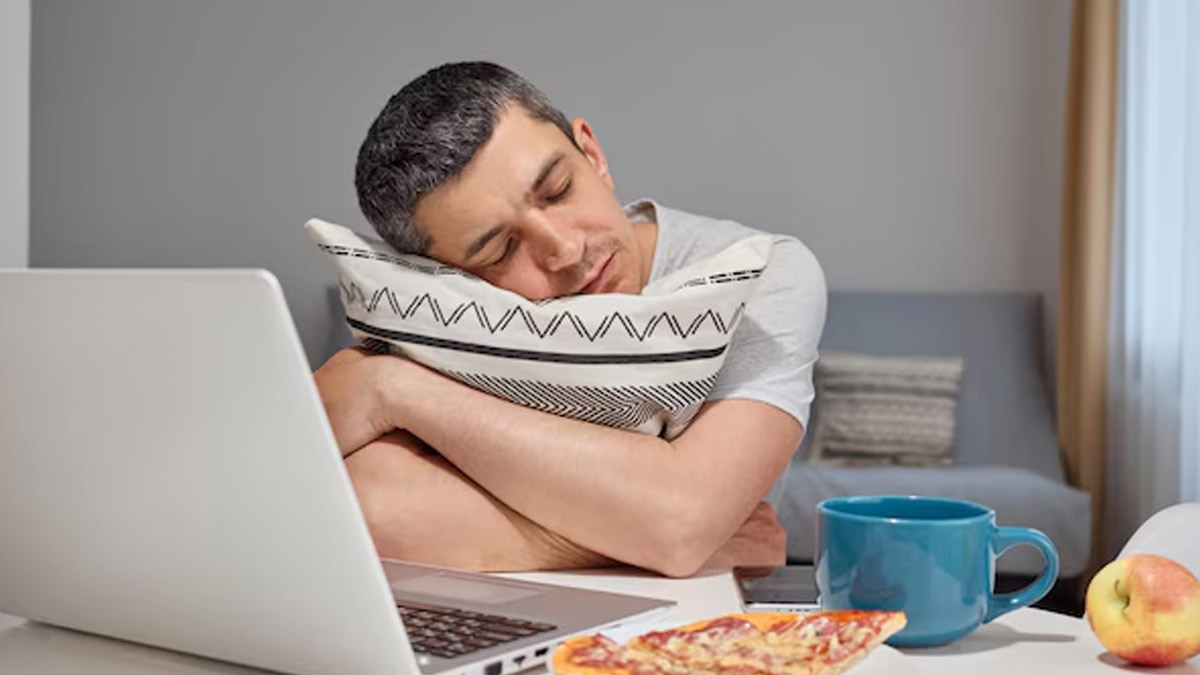
Do you feel extra sleepy after having lunch? So much so that you just can not go about your day without taking a nap? Turns out, there’s an actual medical term for this problem.
Postprandial somnolence, often referred to as post-lunch sleepiness, is a common experience that many people face after eating a meal. This phenomenon can significantly impact productivity and cognitive function, leading to decreased alertness and performance in the afternoon.
Table of Content:-
Talking to the Onlymyhealth team, Chaitali Rajendra Rane, Clinical Dietician, PD Hinduja Hospital, Khar shared that understanding the causes and implementing strategies to manage postprandial somnolence can help mitigate its effects and enhance overall well-being.

What Causes Post-Lunch Sleepiness?
“There can be many reasons why you are experiencing post-lunch sleepiness,” said Rane. She listed:
Circadian Rhythm and Signaling
“One of the primary reasons for post-lunch sleepiness is the natural dip in the circadian rhythm and signalling that occurs in the early afternoon,” said Rane. According to the Sleep Foundation, this dip leads to reduced cognitive attention and an increased drive for sleep, especially if one has not had sufficient rest. The body's internal clock naturally lowers its alertness levels during this time, which can exacerbate feelings of drowsiness.
Hormonal Changes and Cytokines
The Sleep Foundation also elucidated that hormonal fluctuations, particularly the increase in melatonin and serotonin, play a crucial role in inducing sleepiness after a meal. “Additionally, higher levels of cytokines, which are involved in the body's immune response, can contribute to feelings of fatigue and lethargy,” said Rane. These hormonal changes are a natural response to digestion and energy conservation.
Also Read: Feeling Fatigued And Irritated? Avoid These 7 Foods That Can Drain Your Energy

Dietary Factors
The composition of your diet significantly influences post-lunch sleepiness. “Diets rich in simple carbohydrates, such as rice, bread, and baked goods, as well as high-fat foods, trigger the release of more melatonin and serotonin. These hormones promote relaxation and sleepiness as the body prioritises energy conservation for the digestion process,” said Rane.
Managing Post-Lunch Sleepiness
The good news is that post-lunch sleepiness can be easily managed through some dietary and lifestyle tweaks:
Dietary Adjustments
To combat post-lunch sleepiness, eat foods that boost metabolism and energy levels for lunch. “Diets rich in antioxidants, such as fruits and vegetables, and healthy fats from nuts, can help reduce sleepiness. These foods support increased metabolism, which can counteract the fatigue typically experienced after a meal,” said Rane.
Also Read: Women Tend To Suffer More Severely From Chronic Fatigue Than Men: Study

Lifestyle Changes
Implementing certain lifestyle changes can also help manage postprandial somnolence. “Maintaining a regular sleep schedule ensures that you are well-rested and less prone to mid-afternoon fatigue. Engaging in a short walk in the sunshine or exposure to bright light post-lunch can boost alertness and energy levels. Regular exercise, in general, increases metabolism and enhances overall attention levels,” stipulated Rane.
Moderation and Awareness
“While a little sleepiness after lunch is common, excessive drowsiness can be a warning sign of underlying disorders,” warned Rane. If you consistently experience intense sleep attacks after meals, it might be worth consulting a healthcare professional to rule out any serious conditions.
Also Read: Do You Feel Tired All The Time: Expert Lists Causes Of Extreme Fatigue
Postprandial somnolence is a common yet manageable issue that affects daily productivity and overall well-being. By understanding the underlying causes and implementing dietary and lifestyle changes, you can significantly reduce the impact of post-lunch sleepiness. Prioritising a balanced diet, maintaining a regular sleep schedule, and incorporating physical activity into your routine are key strategies to enhance alertness and maintain optimal energy levels throughout the day. If excessive sleepiness persists, seeking professional advice is recommended to address any potential underlying health concerns.
Also watch this video
How we keep this article up to date:
We work with experts and keep a close eye on the latest in health and wellness. Whenever there is a new research or helpful information, we update our articles with accurate and useful advice.
Current Version